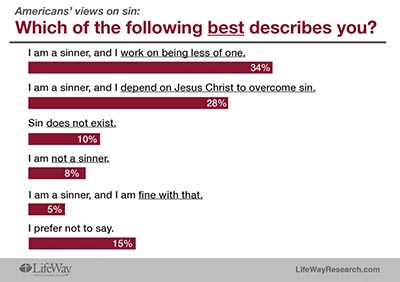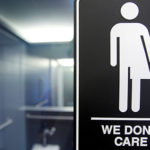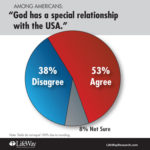NASHVILLE (BP)—Two-thirds of Americans (67 percent) say they are sinners, a new survey reveals. And most people apparently aren’t too happy about it—only 5 percent say they have no desire to mend their ways.
As America becomes more secular, the idea of sin still rings true, said Scott McConnell, executive director of Nashville-based LifeWay Research.
“Almost nobody wants to be a sinner,” he said.
Diverse responses to sin
 Americans tend to fall into varied categories when it comes to sin, according to LifeWay Research’s representative survey of 1,000 Americans.
Americans tend to fall into varied categories when it comes to sin, according to LifeWay Research’s representative survey of 1,000 Americans.
A third (34 percent) of Americans say they are sinners and are working on being less sinful, while a quarter (28 percent) say they are sinners and rely on Jesus to overcome their sin.
One in 10 say sin doesn’t exist (10 percent) or that they are not sinners (8 percent), while a larger 15 percent prefer not to say if they are sinners at all.
Only one in 20 is fine with being a sinner (5 percent).
Among the other findings:
Sign up for our weekly edition and get all our headlines in your inbox on Thursdays
- People in the Northeast (9 percent) are more likely to be fine with being sinners than those in the South (5 percent) and West (4 percent). They’re also more likely to say sin does not exist (14 percent).
- Americans with evangelical beliefs are more likely to say they rely on Jesus to overcome their sin (72 percent) than those without evangelical beliefs (19 percent).
- Nones—individuals with no religious preference—are more likely to say sin does not exist (32 percent). Ten percent of nones say they are fine with being sinners, while 27 percent say they work on overcoming their sin. Six percent say they depend on Jesus to overcome sin.
- Members of non-Christian faiths (27 percent) are more likely to say they are not sinners than Christians (7 percent) and nones (6 percent).
- Catholics are more likely than Protestants to work to be less of a sinner (48 vs. 31 percent) and to say they are not a sinner (11 vs. 5 percent), but less likely to say they depend on Jesus Christ to overcome sin (19 vs. 49 percent).
- Americans 18-44 are twice as likely (14 percent) as those 45 and older (7 percent) to say sin doesn’t exist.
Sin and salvation
A 2016 LifeWay study about theology also found many Americans think sin is commonplace.
In that study, two-thirds (65 percent) agreed everyone sins a little, but most people are good by nature. More than half (57 percent) said it would be fair for God to show his wrath against sin.
However, few Americans seemed to think most sins put them in spiritual danger. Three-quarters (74 percent) of Americans disagreed with the idea that even the smallest sin deserves eternal damnation. That includes almost two-thirds (62 percent) who strongly disagreed.
In the current survey, McConnell said, he was struck by how few Americans—outside of those with evangelical beliefs—say they rely on Jesus to overcome sin, a core Christian belief.
“To some Americans, saying you’re a sinner is a way of admitting you are not perfect,” he said. “To those folks, it doesn’t necessarily mean you’re evil or should be punished for your sin. That’s something the church should pay attention to.”
LifeWay Research conducted the study Sept. 27–Oct. 1, 2016, using the Web-enabled KnowledgePanel, a probability-based panel designed to be representative of the U.S. population. Initially, participants are chosen scientifically by a random selection of telephone numbers and residential addresses. Persons in selected households are then invited by telephone or by mail to participate in the web-enabled KnowledgePanel. Those who agree to participate but do not already have Internet access are provided at no cost a laptop and ISP connection.
Analysts used sample stratification and weights for gender, age, race/ethnicity, region, metro/non-metro, education and income to reflect the most recent U.S. Census data. The completed sample is 1,000 surveys, which provides 95 percent confidence the sampling error does not exceed plus or minus 3.1 percent. Margins of error are higher in subgroups.
















We seek to connect God’s story and God’s people around the world. To learn more about God’s story, click here.
Send comments and feedback to Eric Black, our editor. For comments to be published, please specify “letter to the editor.” Maximum length for publication is 300 words.